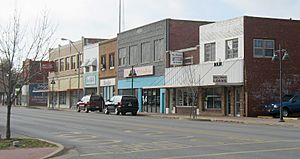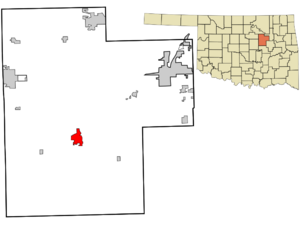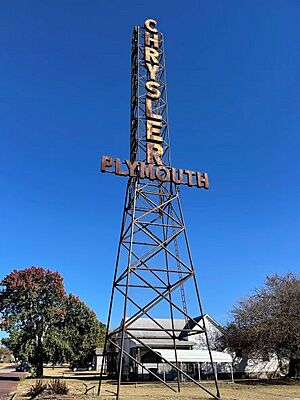Bristow, Oklahoma facts for kids
Quick facts for kids
Bristow, Oklahoma
|
||
|---|---|---|

Main Street in Bristow
|
||
|
||
| Nickname(s):
Woodland Queen of the Creek Nation.
|
||

Location within Creek County, and the state of Oklahoma
|
||
| Country | United States | |
| State | Oklahoma | |
| County | Creek | |
| Area | ||
| • Total | 3.53 sq mi (9.15 km2) | |
| • Land | 3.46 sq mi (8.96 km2) | |
| • Water | 0.08 sq mi (0.20 km2) | |
| Elevation | 820 ft (250 m) | |
| Population
(2020)
|
||
| • Total | 4,248 | |
| • Density | 1,228.46/sq mi (474.34/km2) | |
| Demonym(s) | Bristonian | |
| Time zone | UTC-6 (Central (CST)) | |
| • Summer (DST) | UTC-5 (CDT) | |
| ZIP code |
74010
|
|
| Area code(s) | 539/918 | |
| FIPS code | 40-08900 | |
| GNIS feature ID | 2409913 | |
Bristow is a city in Creek County, Oklahoma, United States. It's a friendly place with a rich history. In 2020, about 4,248 people lived here. Bristow is sometimes called the "Woodland Queen of the Creek Nation."
Contents
History of Bristow
Bristow started in 1898. It grew up around a new railroad track. This track connected Sapulpa and Oklahoma City. The town was named after Joseph L. Bristow. He was an important government official who later became a senator. A post office opened in Bristow on April 25, 1898. By 1900, 626 people lived there.
When Oklahoma became a state, Bristow was chosen as the county seat for Creek County. This meant it was the main town for government. But another town, Sapulpa, wanted to be the county seat too. They had special elections to decide. Sapulpa won both times, even after some arguments about the votes. So, Sapulpa became the county seat.
Bristow's early economy relied a lot on cotton. The town had seven cotton gins. These machines separated cotton fibers from their seeds. There were also two mills that made oil from cottonseed. Farmers in the area also grew corn, peanuts, potatoes, and fruit.
Around 1915, oil and natural gas were found nearby. This discovery brought a big economic boom to Bristow. By 1930, the city had three oil refineries. These places turned crude oil into useful products. Four pipeline companies also set up offices here. Bristow's population grew a lot during this time. In 1930, it reached its highest population of 6,619 people.
Geography and Climate
Bristow is located in northern Oklahoma. It's just south of the middle of Creek County. The city covers about 9.3 square kilometers (3.53 square miles). Most of this area is land, with a small part being water.
Major roads pass through Bristow. Interstate 44, also known as the Turner Turnpike, goes through the northern part of the city. This highway connects Bristow to Sapulpa and Tulsa to the northeast. It also goes southwest to Oklahoma City. Oklahoma State Highway 66, which was once part of the famous U.S. Route 66, runs through the center of Bristow.
Bristow's Weather
Bristow has a varied climate throughout the year. Summers are warm, and winters are cool. The area gets a good amount of rain, especially in spring.
| Climate data for Bristow, Oklahoma | |||||||||||||
|---|---|---|---|---|---|---|---|---|---|---|---|---|---|
| Month | Jan | Feb | Mar | Apr | May | Jun | Jul | Aug | Sep | Oct | Nov | Dec | Year |
| Mean daily maximum °F (°C) | 49.5 (9.7) |
55.3 (12.9) |
65.3 (18.5) |
75.4 (24.1) |
81.3 (27.4) |
88.5 (31.4) |
94.9 (34.9) |
94.2 (34.6) |
86.0 (30.0) |
76.8 (24.9) |
63.0 (17.2) |
52.3 (11.3) |
73.5 (23.1) |
| Mean daily minimum °F (°C) | 23.9 (−4.5) |
28.6 (−1.9) |
38.0 (3.3) |
49.1 (9.5) |
57.0 (13.9) |
65.2 (18.4) |
69.2 (20.7) |
67.5 (19.7) |
60.0 (15.6) |
49.2 (9.6) |
38.0 (3.3) |
27.8 (−2.3) |
47.8 (8.8) |
| Average precipitation inches (mm) | 1.4 (36) |
1.9 (48) |
3.0 (76) |
3.3 (84) |
5.5 (140) |
3.9 (99) |
2.7 (69) |
2.7 (69) |
4.6 (120) |
3.2 (81) |
2.9 (74) |
2.1 (53) |
37.2 (940) |
| Source: Weatherbase.com | |||||||||||||
Bristow's People
| Historical population | |||
|---|---|---|---|
| Census | Pop. | %± | |
| 1900 | 626 | — | |
| 1910 | 1,667 | 166.3% | |
| 1920 | 3,460 | 107.6% | |
| 1930 | 6,630 | 91.6% | |
| 1940 | 6,050 | −8.7% | |
| 1950 | 5,400 | −10.7% | |
| 1960 | 4,795 | −11.2% | |
| 1970 | 4,653 | −3.0% | |
| 1980 | 4,702 | 1.1% | |
| 1990 | 4,062 | −13.6% | |
| 2000 | 4,325 | 6.5% | |
| 2010 | 4,222 | −2.4% | |
| 2020 | 4,248 | 0.6% | |
| U.S. Decennial Census | |||
In 2000, Bristow had 4,325 people living in 1,793 households. About 31.5% of these households had children under 18. The average age of people in Bristow was 36 years old. About 27.9% of the population was under 18.
Economy and Jobs
From the very beginning, Bristow's economy was based on farming. Growing and processing cotton was very important. In the early 1900s, Bristow had many cotton gins and mills. Farmers also grew other crops like corn and peanuts.
The discovery of oil and natural gas around 1914-1915 brought a huge economic boom. This boom lasted until about 1923. The population grew a lot during this time. By 1920, nearly 31,000 people lived close to Bristow.
Even after the oil boom slowed down, Bristow remained important for the oil industry. By 1930, it had three oil refineries. Several companies related to petroleum also had offices there. In 1925, KFRU, one of Oklahoma's first radio stations, started broadcasting from Bristow.
In the 1960s, some factories opened in Bristow. These included a mattress factory and companies that made fiberglass boats and women's clothes.
Transportation in Bristow
Bristow is easy to reach by car. It's located on Interstate 44, Oklahoma State Highway 66 (the old Route 66), Oklahoma State Highway 48, and Oklahoma State Highway 16.
For air travel, the Jones Memorial Airport is about 3 miles southwest of the city. It has a long asphalt runway. This airport helps the local economy by millions of dollars each year. For bigger flights, people use Tulsa International Airport, which is about 40 minutes away.
Trains still carry goods through Bristow. While passenger trains don't stop here anymore, you can visit the Bristow Historical Train Depot & Museum. It has the original wooden floors from 1923!
Arts, Entertainment, and Recreation
Bristow offers several places for arts, entertainment, and outdoor fun.
Arts and Entertainment Venues
The Freeland Center for the Performing Arts opened in 2009. It's a large theater with 795 seats. The center hosts many different shows and events. It aims to promote cultural enjoyment for everyone.
The Bristow News newspaper has been reporting local events since 1899. It keeps the community informed about what's happening.
Parks and Outdoor Fun
Klingensmith Park is a big park with 320 acres. It features Lake Mesina, a beautiful lake. The park also has the Klingensmith Park Amphitheater. This outdoor theater was built in 1936 as a WPA project. Eleanor Roosevelt dedicated it in 1937, and it's still used today!
The Town Square is located on Historic Route 66/Main Street. It has a small amphitheater and is a popular spot for community events.
The Leon Pinson Sports Complex has fields for softball and baseball. It also includes the Bristow Rodeo Grounds.
The VFW Post 3656 Wake Island Memorial honors the Battle of Wake Island from World War II. It has military equipment on display.
If you like golf, the Bristow Golf & Country Club has a public 9-hole course.
Heyburn Lake is about 13 miles northeast of Bristow. It's a great place for camping, picnics, and playing. You can also launch boats, swim, and fish there.
Historic Places in Bristow
Bristow has several buildings and sites listed on the National Register of Historic Places. These places are important for their history and architecture.
- The old Beard Motor Company, also known as Bristow Chrysler Plymouth, was built in 1947. It's famous for its Art Moderne style and its tall 75-foot Chrysler Plymouth sign. This sign was made to be seen from Route 66.
- The Art Deco style Bristow Firestone Service Station is another historic building.
- The Gothic Revival style Bristow Presbyterian Church is also listed.
- The Creek Masonic Lodge No. 226 is a substantial historic building.
Several sites connected to the old Route 66 are also historic. These include the Texaco Service Station and the Bristow Tire Shop. There's even a part of the old Route 66 roadbed that is now a historic site.
Famous People from Bristow
Many interesting people have connections to Bristow:
- Brent Ashabranner: An author and Peace Corps administrator who lived in Bristow as a teenager.
- Gene Autry: Known as The Singing Cowboy, he was an actor, rodeo performer, and singer. He worked as a telegrapher at Bristow's train depot.
- Charles Crawford: A football running back who played for the Philadelphia Eagles.
- Josiah Henson: A bronze medalist in wrestling at the 1952 Summer Olympics.
- Robert Hughes: The winningest boys high school basketball coach in the United States.
- Tom Paxton: A folk singer who moved to Bristow with his family in 1948.
- Norma Smallwood: The first Native American Miss America, crowned in 1926.
See also
 In Spanish: Bristow (Oklahoma) para niños
In Spanish: Bristow (Oklahoma) para niños
 | John T. Biggers |
 | Thomas Blackshear |
 | Mark Bradford |
 | Beverly Buchanan |



